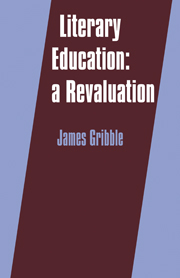Book contents
- Frontmatter
- Contents
- Acknowledgements
- Introduction Literature, life and education: some problems about how they relate to one another
- 1 Literature and truth
- 2 Literary criticism and literary education
- 3 Objectivity and subjectivity in literary education
- 4 The subordination of criticism to theory: structuralism and deconstructionism
- 5 Literature and the education of the emotions
- 6 Empathy and literary education
- 7 Literary intention and literary education
- 8 Literature, morality and censorship
- Notes
- Index
4 - The subordination of criticism to theory: structuralism and deconstructionism
Published online by Cambridge University Press: 01 June 2011
- Frontmatter
- Contents
- Acknowledgements
- Introduction Literature, life and education: some problems about how they relate to one another
- 1 Literature and truth
- 2 Literary criticism and literary education
- 3 Objectivity and subjectivity in literary education
- 4 The subordination of criticism to theory: structuralism and deconstructionism
- 5 Literature and the education of the emotions
- 6 Empathy and literary education
- 7 Literary intention and literary education
- 8 Literature, morality and censorship
- Notes
- Index
Summary
I have attempted to characterize some of the distinctive concepts and procedures of literary criticism and to defend the activity against a variety of misconceptions. I have suggested that some of these misconceptions are a result of the reluctance of literary critics to be articulate about the nature of their pursuit. Uncertainty about the justification for criticism has helped to enable the widespread circulation of structuralist and post-structuralist approaches to literature.
Jonathan Culler, in Structuralist Poetics, observes that ‘few of the many who write about literature have the desire or arguments to defend their activity… If the role criticism has been called upon to play in the educational system serves to explain the quantity of critical writings it does little to justify the activity itself.’ Culler aims to make out a case for criticism as ‘an independent mode of knowledge’, ‘a coherent discipline’ and to do so he turns to the model of linguistics.
The linguistic model … helped [French critics] to justify the desire to abandon literary history and biographical criticism … the conclusion that literature could be studied as ‘a system with its own order’ has been enormously salutary, securing for the French some of the benefits of Anglo-American ‘New Criticism’ without leading to the error of making the individual text an autonomous object that should be approached with a tabula rasa.
According to Culler, criticism which focuses ‘on the text itself’, which ‘prizes this encounter and the resulting interpretations’ is ‘more difficult to defend’ than historical scholarship which was ‘once the dominant mode of criticism’.
- Type
- Chapter
- Information
- Literary EducationA Revaluation, pp. 77 - 94Publisher: Cambridge University PressPrint publication year: 1983

